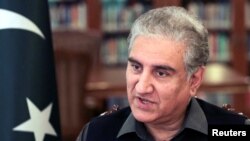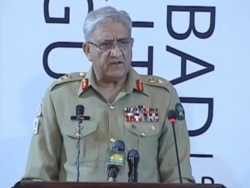Pakistan’s top diplomat on Saturday publicly stated for the first time that his ministry had severed ties with Afghanistan’s national security adviser, Hamdullah Mohib, over incendiary remarks about its southern neighbor that undermined regional peace efforts.
Shah Mehmood Qureshi made the disclosure a week after a highly placed Pakistani official told VOA that Islamabad had conveyed to Kabul “through informal channels” it would no longer conduct official engagements with Mohib.
Mohib routinely accuses Pakistan, particularly its military, of supporting the Taliban insurgency in his country, charges Islamabad rejects.
But last month, Mohib compared the neighboring country to a notorious red light district in Lahore called Heera Mandi while addressing a public gathering along the Pakistani border in eastern Nangarhar province.
“My blood has been boiling ever since you compared Pakistan to a brothel house. You should be ashamed of yourself and must reform your conduct,” Qureshi said of Mohib in speaking to reporters Saturday in his native eastern city of Multan.
“As a foreign minister of Pakistan, I tell you that no Pakistani will talk to you or shake hands with you until you stop foul-mouthing Pakistan,” he added.
'Creating obstacles'
Qureshi said the international community had been “appreciative” of his country’s continued efforts to help find a negotiated settlement to the Afghan war and bring stability to the country.
The chief Pakistani diplomat alleged that Mohib “in fact is playing the role of a spoiler and creating obstacles on the road to peace in Afghanistan.”
The Afghan government did not immediately comment on Qureshi’s remarks.
Last week, Mohib told reporters that Kabul had not been officially told of Islamabad's warnings that it would sever ties with him, and he said it was premature to comment on media reports attributed to unnamed Pakistani officials.
“The Afghan government will respond to it through relevant diplomatic channels whenever the information is formally conveyed to it,” Mohib said.
Diplomatic sources told VOA that during a recent visit to Kabul, Pakistan’s military chief, General Qamar Javed Bajwa, raised concerns about Mohib’s “undignified remarks” in his meeting with Afghan President Ashraf Ghani in the presence of General Nick Carter, the head of Britain’s military and key player in peace negotiations ahead of the U.S.-NATO troop withdrawal.
A senior Pakistani official privy to the matter told VOA on condition of anonymity his government had lodged a strong protest with the Afghan side and had conveyed “deep resentment” in Pakistan over Mohib’s “undignified” remarks.
Washington also had stopped meetings with the Afghan national security adviser over controversial remarks he made on a visit to the U.S. two years ago, though contact with him has since resumed.
Mohib had accused Zalmay Khalilzad, U.S. special representative for Afghanistan reconciliation, of undercutting the Kabul government in U.S.-Taliban peace negotiations.
Accord set stage for drawdown
Khalilzad was leading the talks that culminated in an agreement with the insurgents in February 2020, setting the stage for the foreign troop drawdown from the war-torn nation, which began May 1 and is expected to be completed by September 11.
While U.S. officials have praised Pakistan for bringing insurgents to the negotiating table to discuss a peace arrangement with the Afghan government, they have also reiterated their long-held claims that senior Taliban leadership lives in Pakistan.
In an interview with Germany's Der Spiegel, Zalmay Khalilzad, the U.S. special representative for Afghanistan reconciliation, said:
"If this peace effort doesn't succeed, and if there is no agreement between Pakistan and Afghanistan, Pakistan will suffer. Pakistan will be blamed because so much of the Taliban’s leadership lives in Pakistan."
The controversy stemming from Mohib’s remarks again has highlighted political tensions and historic mistrust plaguing relations between Pakistan and Afghanistan, which share a nearly 2,600-kilometer border.
Editor's note: An earlier version of this article quoted Afghan National Security Adviser Hamdullah Mohib as having described Pakistan as a “brothel house.” In fact he used the name of a historic red light district in Lahore which is often understood as a metaphor for a place of prostitution.






